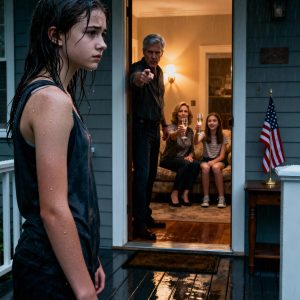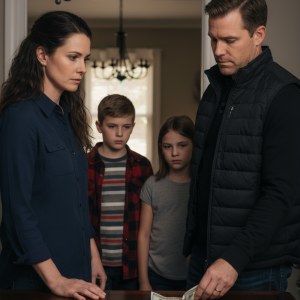The panic started when I was eight, the autumn we traded our bright suburban split‑level for a brooding Victorian on Maple Street. Its slanted ceilings cast jagged silhouettes, and the century‑old floorboards croaked like they were keeping confidences.
Mom’s new hospital appointment and my little brother’s experimental treatments had drawn us to the city, courtesy of a charity that arranged housing near research facilities. Our move was all logic on paper—yet every creak of that house felt fundamentally wrong.
My room boasted tall windows and book‑lined walls, but the showpiece was a towering four‑poster bed left by the previous owners. Two feet of black cavity gaped beneath it—a mouth wide enough to swallow a kid whole.
I soon sensed a resident below the mattress—not claws or glowing eyes, but something deliberate and watchful. Footfalls hushed across wooden slats, fabric whispered against beams, and now and then came murmurs in an alien tongue.
Mom chalked it up to “adjustment anxiety.” Dad performed nightly flashlight inspections. Meanwhile, medical appointments and trial schedules consumed their attention. My fear, they decided, was just stress in a child-sized body.
When the terror refused to fade, they enrolled me with Dr. Martinez, a therapist who armed me with breathing drills, worry journals, and CBT routines. Still, every sundown, dread clung to me like a second skin.
Logic told me monsters weren’t real; instincts begged to differ. Proof collapsed the moment the lights dimmed, and an ancient instinct insisted I was not alone.
Middle school let me rationalize the presence as leftover trauma; high school persuaded me it was history’s echo. I filled the room with soft music and slept to the hum of distraction.
By college, I chose dorms with concrete floors and platform bunks—no crawl spaces allowed. I mastered calm, earned degrees, and entered healthcare administration, building a life framed in fluorescent certainty.
My adult apartment was equally pragmatic: ground‑floor, bright, a platform bed flush to the floor. Five peaceful years convinced me I’d outgrown the Maple Street ghost.
Workdays were full of clinical trial briefs and foundation grants; nights ended with technical journals that lulled me to sleep. Anxiety seemed a relic—until last Tuesday.
I’d just reached for the lamp when a voice drifted from the foot of the bed: “Please don’t be afraid.” It was soft, polite—yet impossible.
My mind sprinted through rational excuses—fatigue, meds, vent acoustics. But the voice persisted, calm and crystalline: “I know you hear me.”
She introduced herself as Elena. She claimed to “live here too,” in the gaps between moments, watching over the space for a very long time.
Terrified yet strangely compelled, I demanded proof. The mattress dipped as though someone had perched beside me, unseen.
“You’re the presence from Maple Street,” I blurted. Elena’s warm affirmation unlocked memories of stormy nights soothed by invisible lullabies.
She called herself a guardian—one who appears when families are tested by illness and upheaval. She had sheltered us during my brother’s darkest hospital nights and had returned because I was faltering under new burdens.
Elena spoke of my crushing workload, my fear of failing families hanging their hopes on our trials. She framed my stress as dimming light only I could reignite.
An hour passed in whispered conversation: about compassion fatigue, generational research, and the collective web of people pushing medicine forward. Her insight steadied my heartbeat more effectively than any breathing drill.
As dawn smeared pink across the blinds, her voice faded. “Healing is never solitary,” she reminded me. “Call on what you can’t yet explain.”
I called in sick, researched meditation, and emailed rival labs to suggest collaboration instead of competition. That afternoon I volunteered to train new foundation staff—sharing wisdom instead of stockpiling it.
Within weeks, balance returned: clinical trials expanded, grants grew, and a network of peers pushed our pediatric protocols further than I’d managed alone.
A family soon wrote: their daughter’s recovery owed everything to our therapy. As I read their letter, a gentle warmth settled beside me—Elena’s silent applause.
Now, on difficult nights, I sense her close. Not a monster, never a threat—just a guardian who taught me that unseen support weaves through every act of healing.
The shadow under my bed had never wanted to harm me. She waited years for me to grow into the work I was meant to do, then reminded me I was never meant to do it alone.
So I honor Elena—and every hidden helper—by lighting the way for others: building programs, sharing knowledge, and trusting that some allies dwell in places beyond the edge of reason, keeping watch while we dream of cures.





